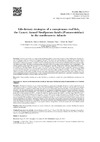Identificador persistente para citar o vincular este elemento:
https://accedacris.ulpgc.es/jspui/handle/10553/49558
| Título: | Life-history strategies of a conspicuous reef fish, the canary damsel similiparma lurida (Pomacentridae) in the northeastern atlantic | Otros títulos: | Estrategias de vida de un relevante pez de arrecife, la fula negra Similiparma lurida (Pomacentridae) en el Noroeste Atlántico | Autores/as: | García-Mederos, Antonio M. Tuya, Fernando Tuset, Víctor M. |
Clasificación UNESCO: | 241705 Biología marina 240119 Zoología marina 240102 Comportamiento animal 310503 Localización de peces |
Palabras clave: | Pomacentridae Similiparma lurida Life history Recruitment Coastal fish, et al. |
Fecha de publicación: | 2016 | Editor/a: | 0214-8358 | Publicación seriada: | Scientia Marina | Resumen: | Similiparma lurida is a common fish inhabiting shallow-water rocky bottoms of the northeastern Atlantic oceanic archipelagos, and the coasts from Portugal to Senegal. This study was conceptualized to integrate information relative to key population traits of S. lurida, including length and age structure, growth, reproduction and length at maturity, with a description of abundance patterns on shallow reefs, including temporality of recruitment and habitat preferences by juveniles, sub-adults and adults. We then hypothesized that seasonal cycles of spawning and recruitment were synchronized. This species reaches a total length (TL) of up to 15.7 cm and an age of 18 years. Males grow faster and longer (K=0.28 years–1, L∞=14.487 cm TL) than females (K=0.23 years–1, L∞=13.461 cm TL), which affects the overall ratio of males to females (1:0.26). The size at which 50% of sexual maturity is reached was 10.344 cm TL for males and 8.471 cm TL for females. Fish increase growth during the spawning season, which occurs from November to March, including a maximum in February. After two months of this peak, juveniles reached maximum abundances (April) in high relief reef areas. Adults, however, show a preference towards rocky bottoms covered with algae interspersed with sand patches, suggesting ontogenetic changes in microhabitat preferences when juveniles turn into adults. | URI: | https://accedacris.ulpgc.es/handle/10553/49558 | ISSN: | 0214-8358 | DOI: | 10.3989/scimar.04343.28A | Fuente: | Scientia Marina [ISSN 0214-8358], v. 80, p. 57-68 |
| Colección: | Artículos |
Citas SCOPUSTM
4
actualizado el 08-jun-2025
Citas de WEB OF SCIENCETM
Citations
6
actualizado el 22-feb-2026
Visitas
266
actualizado el 16-ene-2026
Descargas
212
actualizado el 16-ene-2026
Google ScholarTM
Verifica
Altmetric
Comparte
Exporta metadatos
Los elementos en ULPGC accedaCRIS están protegidos por derechos de autor con todos los derechos reservados, a menos que se indique lo contrario.
